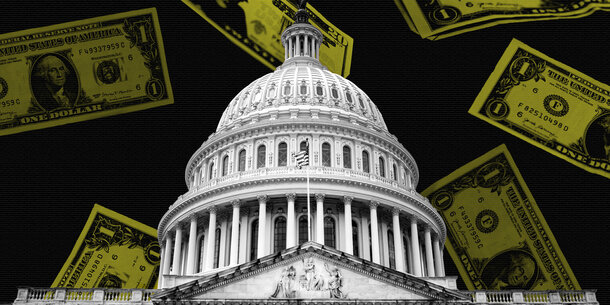Members of Congress are allowed to trade stocks, and almost all of them own shares in public companies. Placing stricter rules on congressional stock trading is a key ethics reform that’s critical to restoring public trust in Congress.
Why is congressional stock trading a problem?
Lawmakers often have access to nonpublic information that can move financial markets, as well as the power to shape policies in sectors in which they have financial interests. This creates potential for members to personally profit off their offices when they trade individual stocks. Underscoring the risks, a New York Times investigation discovered that from 2019 to 2021, 18 percent of members of Congress traded stocks in sectors related to the work of the congressional committees they sat on.
Recent examples of these potential conflicts of interest abound. Lawmakers on both sides of the aisle made beneficial stock trades during the early days of the Covid-19 pandemic and ahead of economic recessions after receiving briefings and early nonpublic information about the dramatic changes in the economy.
In September 2008, Republican Rep. Spencer Bachus of Alabama, chair of the House Financial Services Committee, attended a private meeting with the treasury secretary and the chair of the Federal Reserve. The next day, he bought stocks betting that the markets would fall, and he profited when they did. On January 24, 2020, the Senate Committee on Health held a closed-door meeting about the possible effects of the Covid-19 pandemic on the economy, and in February 2020, California Democratic Sen. Dianne Feinstein, a member of the committee, made significant stock trades shortly before financial markets took a turn for the worse when the broader public became aware of the scale of the pandemic. The timing of the sale raised suspicions and prompted allegations of insider trading. Rep. Rob Bresnahan Jr. (R-PA) sold hundreds of thousands of dollars’ worth of bonds issued by the Allegheny County Hospital Development Authority on March 27, 2025, a month after he voted for a law that would cut Medicaid and put hospitals in that area at risk of closure.
A recent poll found that 7 in 10 Americans hold unfavorable views of Congress. Because of the inherent risk of self-dealing, congressional stock trading poses genuine ethical concerns that undermine public trust and accountability in the institution. Polling also shows that the vast majority of both Republican and Democratic voters support a ban on congressional stock trading.
What is wrong with existing rules on congressional stock trading?
Congressional stock trading has long spurred widespread public outrage, but existing regulations and processes have failed to adequately address the problem.
The Securities Exchange Act of 1934 aimed to prevent insider trading on the stock market by mandating disclosures, but that requirement did not apply to members of Congress. It took more than seven decades for the Stock Act, introduced in 2006 and passed in 2012, to partially close that loophole. It requires members of Congress to disclose stock trades of more than $1,000 within 30 days. But penalties for failing to disclose are extremely weak — a mere $200 for a first-time violation.
Violations are also difficult to uncover. The Office of Congressional Conduct (previously the Office of Congressional Ethics) is an independent body in the House tasked with investigating violations and referring investigations to the House Ethics Committee, but the investigations are private, the office has no subpoena power, and it can be abolished at any time simply by changing House rules. Though the Senate has the Senate Ethics Committee, tasked with administering financial disclosures and investigating allegations of misconduct, no independent investigatory body like the Office of Congressional Conduct exists in the Senate.
As a result, enforcement remains spotty at best. A report by Business Insider found that Congress does not enforce these accountability mechanisms and many members fail to disclose their trades.
What changes could address issues with congressional stock trading?
Over the past several years, public outcry over the $150 million in stocks traded by members during the Covid-19 pandemic ushered in a renewed push to expand and revise regulations on stock trading by members of Congress. Various policy proposals have been suggested. For example, one proposal would require members of Congress to sell their securities holdings and then place the proceeds in what’s known as a blind trust — an account managed by an independent trustee whose assets are hidden from the beneficiary, thereby avoiding conflicts of interest.
Other proposals include permitting lawmakers to keep only the stocks they owned prior to holding office and prohibiting them from acquiring new stocks once elected, or absolutely banning members from holding any stocks. Restrictions on stock trading are internationally recognized as a central part of legislative transparency, and many parliaments have implemented some version of these proposals.
These policies must also be more than just rules on paper. There needs to be stronger enforcement mechanisms for all congressional ethics rules. Congress should grant the Office of Congressional Conduct — which investigates violations of stock trading and other ethics rules in the House — subpoena power, make it statutory (so it does not rely on reauthorization every Congress), and create a similar body in the Senate. This would allow for more rigorous enforcement of new and existing accountability mechanisms.
What are the prospects for reform?
Leaders from both parties have recently declared public support for some form of a ban on congressional stock trading, including former President Joe Biden, House Speaker Mike Johnson (R-LA), House Minority Leader Hakeem Jeffries (D-NY), former House Speaker Nancy Pelosi (D-CA), and Treasury Secretary Scott Bessent.
Different bill proposals have floated around Congress in recent years, including some that ban stock trading altogether and others that propose various restrictions on trading. Some have garnered significant bipartisan support and even been voted out of committee and advanced through the legislative process. So far, however, all have fallen short of crossing the legislative finish line.
Now that Congress has reconvened after its summer recess, there is likely to be new momentum for bipartisan proposals to regulate congressional stock trading, driven by broad public consensus in favor of increased safeguards and a growing realization that change is overdue.
Correction: This piece has been corrected to reflect that Rep. Spencer Bachus attended a private meeting with the treasury secretary and the chair of the Federal Reserve in 2008, not 2018.



